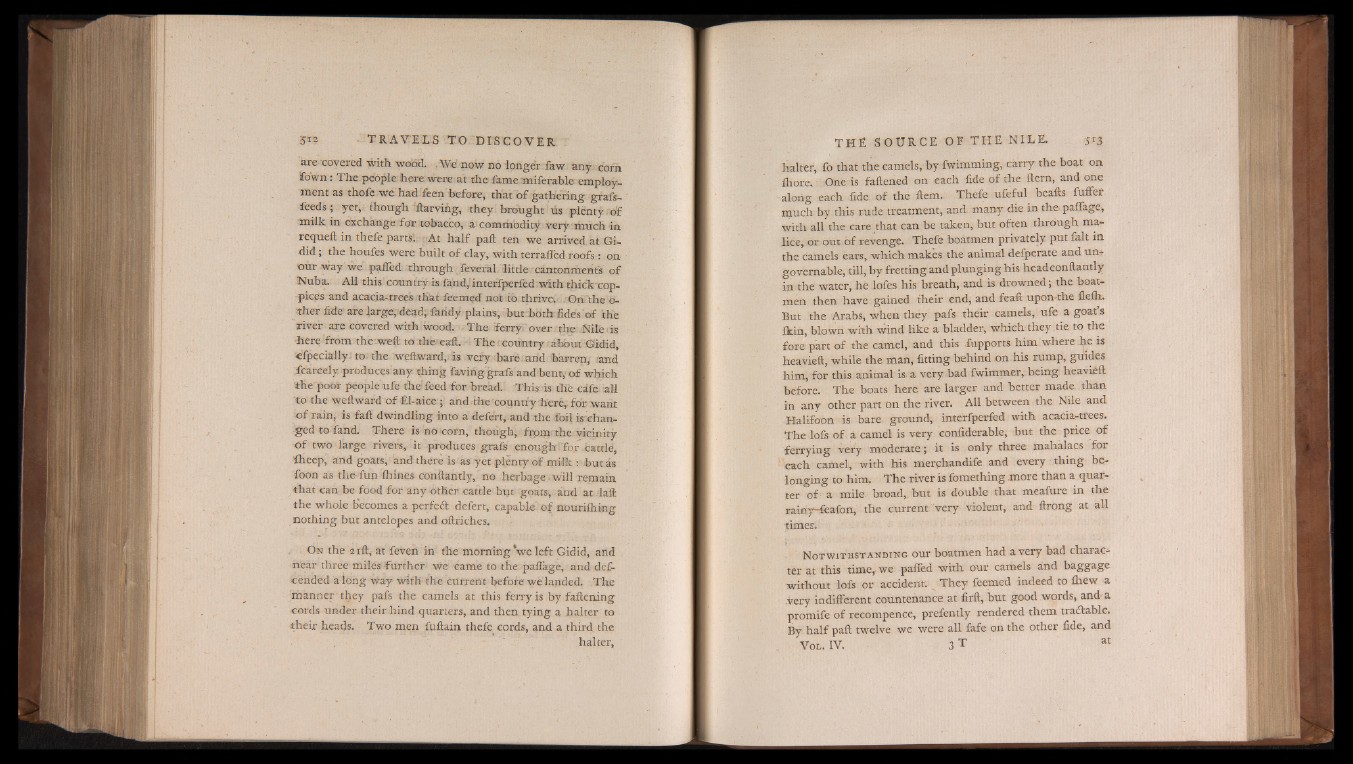
are covered with wood. . We now no longer faw any corn
Town: The people here were at the fame miferable employment
as thofe we had feen before, that o f gathering grafs-
feeds; yet, though ilarving, they brought tis plenty o f
m ilk in exchange fo r .tobacco, a- commodity very much in
requeft in thefe parts. At h a lf pall; ten we arrived at Gi-
d id ; the houfes were built o f clay, with terraffed roofs : on
our way w e paffed through feveral little cantonments o f
Nuba. All this country is fand, interfperfed with thick cop-
pices and acacia-trees that feemed not to thrivep On the o-
ther fide are large, dead, faridy plains, but both iides o f the
river are covered witffwood. The fer ry " over. the .Nile ds
here from thewe ft to the eaft. The 'country about G idid,
efpecially to the weftward, is very bare arid barren, rand
fcarcely produces1 any thin g favinggrafs and bent, o f which
th e poor people ufe the: feed for bread. This is the cafe all
to the weftward o f El-aice; and the country 'here,, for want
o f rain, is fail dwindling into a defert, and the foil is chang
ed to fand. There is no ¡corn, though, frpnrthe vicinity
o f two large rivers, it produces grafs enough !fo,r cattle,
iheep, and goats, and there is as y e t plenty o f milk ; but as
foon as the-fun fhines conllantly, no herbage .w ill remain
that can be food for any other cattle but goats, and at. laffi
the whole becomes a perfeft defert, capable o f nouriihing
nothing but antelopes and oftriches.
O n the aift, at feven in the morning ’we left Gidid, and
near three miles further we came to the pailage, and descended
a long way with the current before w e landed. The
manner they pafs the camels at this ferry is by fattening
cords under their hind quarters, and then, tying a halter to
their heads. Two men fuftain thefe cords, and a third the
halter,
halter, fo that the camels, by fwimming, carry the boat on
ihore. One is fattened on each fide o f the ftern, and one
along each fide o f the ftetn. Thefe ufeful beafts fuffer
much by this rude treatment, and many die in the paffage,
with all the care that can be taken, but often through ma*
lice, or out o f revenge. Thefe boatmen privately put fait in
the camels ears, which makes the animal defperate and ungovernable,
till, b y fretting and plunging his headeonftantly
in the water, he lofes his breath, and is drowned; the boatmen
then have gained their end, and feaft upon-the fleih.
But the Arabs, when they pafs their camels, ufe a goat’s
ikin, blown with wind like a bladder, which they tie to the
fore part o f the camel, and this fupports him where h e is
heavieft, while the man, fitting behind on his rump, guides
him, for this animal is a very bad fwimmer,. being heavieft
before. The boats here are larger and better made, than
in any other part on the river. All between the Nile and
Halifoon is bare ground, interfperfed with acacia-trees.
The lofe o f a camel is very confiderable, but the price o f
fe r ry in g very moderate; it is only three mahalacs for
each camel, with his merghandife and every thing belo
n g in g to him. The river is fomething more than a quarter
o f a mile broad,, but is double that meafure in the
rainy-ieafon, the current very violent, and ftrong at all
times.
N o t w i t h s t a n d i n g our boatmen had a very bad character
at this time, we palled with our camels and baggage
without lofs or accident. They feemed indeed to ihew a
.very indifferent countenance at firft, but good words, and a
promife o f recompence, prefently rendered them tractable.
By h a lf paft twelve we were all fafe on the other fide, and
V o l . IV. 3 t at